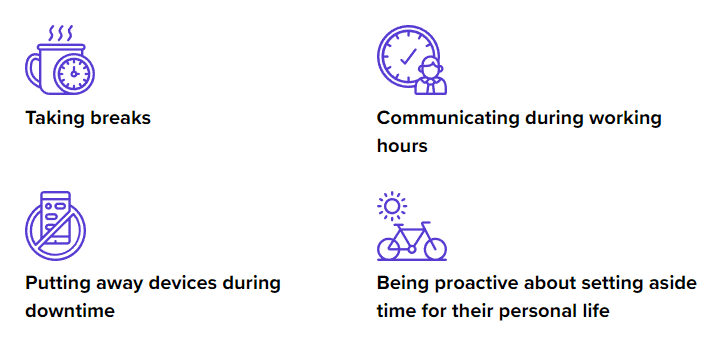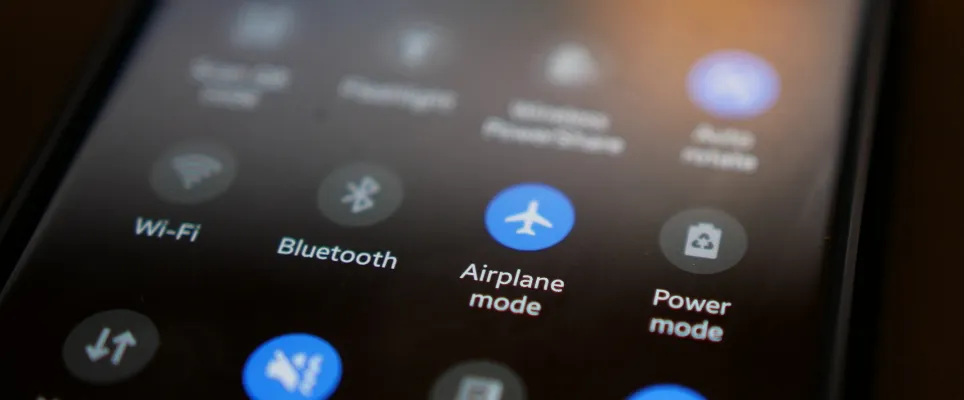Communicating within appropriate boundaries
If you decide to take a break from social media, that’s a personal choice. If you’re usually slow to return your friend’s phone calls, again that’s a decision for you to make.
But at work, you’re expected to communicate. If you don’t fulfil certain elements of your role, you may find your behaviour being questioned or challenged.
You have to find a way to communicate within appropriate boundaries – in a way that suits you, allowing you to have a productive day at work without feeling like you’re fighting off a stream of notifications demanding your attention. Here is some advice:
Know what’s expected of you
This will vary between companies and even departments. Some of it will depend on your role. For example, a customer-facing job may involve a lot more in-person communication than an accounts role. The important thing is that as an employee you know what’s expected from you in terms of communications.
It’s helpful to define which communication methods will be used – when and for what purposes. For example, you may prioritise phone calls for urgent issues, emails for anything that require more detail, and an instant messenger (like Slack or Workplace) for general chatting. The other thing that’s useful to clarify is the expectations around response times. It should be rare to need to answer immediately.
Some companies will establish these expectations themselves ( Buffer has ground rules on when to use Slack or not ), but if not, you can start the conversation about why it’s so important.
Don’t check your alerts when you’re on holiday
As we’ve discussed, you need time off to be productive at work. Rest is important. And you won’t be able to fully switch off from work if you have alerts on. All it takes is a distracting email or a message to pop up and you’ll be thinking about work when you should be switching off.
If you think that’s unreasonable or are struggling, talk to someone
It’s natural to feel uncomfortable with setting boundaries. At work we tend to allow others to dictate how we manage our time. But if you feel like the communication expectations are unreasonable, you need to talk to someone about it. Don’t be shy about reminding others about any agreements in place. This will encourage them to protect their schedule, too.
Share your communication preferences widely
It’s important to find ways to communicate when you are (and are not) available – for example, by outlining your usual working hours on a synced company calendar, making use of different statuses on instant messengers or including upcoming holiday on your email signature. The more others seem to be doing something, the more likely other people are to think that thing is right or normal.
The importance of leaders setting the right example
All managers need to set the right example about work-life balance and effective communications in order to ensure their team is productive. If a manager is constantly working long hours and never taking a break, his or her team is likely to do the same.
When we overwork ourselves, we’re essentially running on empty. We’re pushing ourselves beyond our limits, and it’s not sustainable. Eventually, we hit a wall. We get tired, our productivity suffers, and we just can’t keep going. This is what people refer to as ‘burnout.’
Burnout can have a serious impact on our mental and physical health. It’s important to take breaks, rest, and recharge when we’re feeling overwhelmed or stressed. Otherwise, we risk running ourselves into the ground. When we do, it’s hard to bounce back. So if you’re feeling overwhelmed at work, make sure to take a step back and reevaluate your priorities. Seeing those in positions of influence do the same can be incredibly powerful.
Think about it. If a manager is always checking his or her phone or email during meetings or meals, this sends the message that work is more important than anything else. Instead, managers should strive to model healthy work-life balance and effective communication. Ways managers can set the right example include:

If you’re in a managerial position, just remember to ask yourself whether you really need to send that email over the weekend or can send it for the following week? Scheduling your communication sends a clear message you prioritise other people’s downtime. When team members see that their manager is taking care of themselves, they’re more likely to do the same.
Tips and tricks for maintaining your focus
In today’s fast-paced work environment, it’s more important than ever to maintain your focus. With constant distractions from email, social media, and colleagues, it can be easy to lose track of what you’re supposed to be doing.
However, there are several good reasons to stay focused on the task at hand. For one thing, it’s simply more efficient to complete one task before moving on to the next. Not only that, but staying focused can help to prevent mistakes and increase the quality of your work. When you’re able to give your full attention to a task, you’re more likely to catch small details that you might otherwise miss. Additionally, staying focused can help you to remain calm and avoid feeling overwhelmed by your workload.
So next time you find yourself getting distracted, take a deep breath and remind yourself of why it’s so important to stay on task. Try these tips for maintaining your focus:
Try greyscale
In our modern world, we’re constantly bombarded with notifications from our phones, computers, and other devices. Whether it’s a new email, a text message, or a social media update, these constant interruptions can be extremely distracting. One way to help reduce the impact of notifications is to use greyscale mode on your devices. When everything is displayed in shades of grey, it becomes much less attention-grabbing. As a result, you’re less likely to feel the need to check your phone every time it buzzes. Additionally, greyscale can help to reduce eye strain and fatigue.
Reduce the number of screens around you
If you want to stay focused while working, one of the best things you can do is put your phone away. Having your phone within reach can be a major distraction, so put it in another room or turn it off altogether. This way, you won’t be tempted to check it every few minutes and can instead focus on your task.
Pause or mute notifications
Did you know the average worker is interrupted somewhere between four to 12 times every hour? In the best case scenario, that’s being interrupted every 15 minutes. And as we’ve already discussed it can take over 20 minutes to get back on track.
That adds up to a lot of wasted time. Not to mention, all of those interruptions can be hugely disruptive to your workflow. If you’re looking for a way to increase your focus and productivity at work, muting your notifications may be the answer. By silencing your email, text, and social media alerts, you can eliminate distractions and better utilise your time. What’s more, you’ll be less likely to make mistakes when you’re not trying to juggle multiple tasks at once. So if you’re ready to boost your productivity, start by hitting the mute button.
Try timeboxing
Timeboxing is a powerful way of managing your time. You essentially block out periods of time to work on different things. It’s a way of protecting your own time to do what you need to. Whether that’s time for deep thinking, research, personal development or working on client pitches – it’s up to you. What’s important is that you’ll block this time out in your calendar in a meaningful way. Describing what you’re doing will help to prevent others from trying to steal your time as it’s clear what you’re working on.
Have a clear start and end to your day
It’s important to have a clear start and end to your working day for a number of reasons. First, it helps you to stay focused on your work and avoid burnout. If you know that you have a specific amount of time to complete your tasks, you can work more efficiently and avoid wasting time.
Secondly, it allows you to enjoy your personal time more fully. When you know you have a set time for work, you can relax and enjoy your free time without worrying about unfinished business. If you have set hours for work, you can more easily make time for family, friends, and other important aspects of your life. Similarly, with time set aside for leisure activities and relaxation, it’s easier to enjoy those activities without feeling guilty or anxious.
Our home and professional lives should work together. A happy life won’t make you enjoy a job you hate – and a great job cannot compensate for an unhappy life. In order to maximise our own workplace wellbeing, we need to learn to switch off without feeling guilty or checking for the latest notification.



